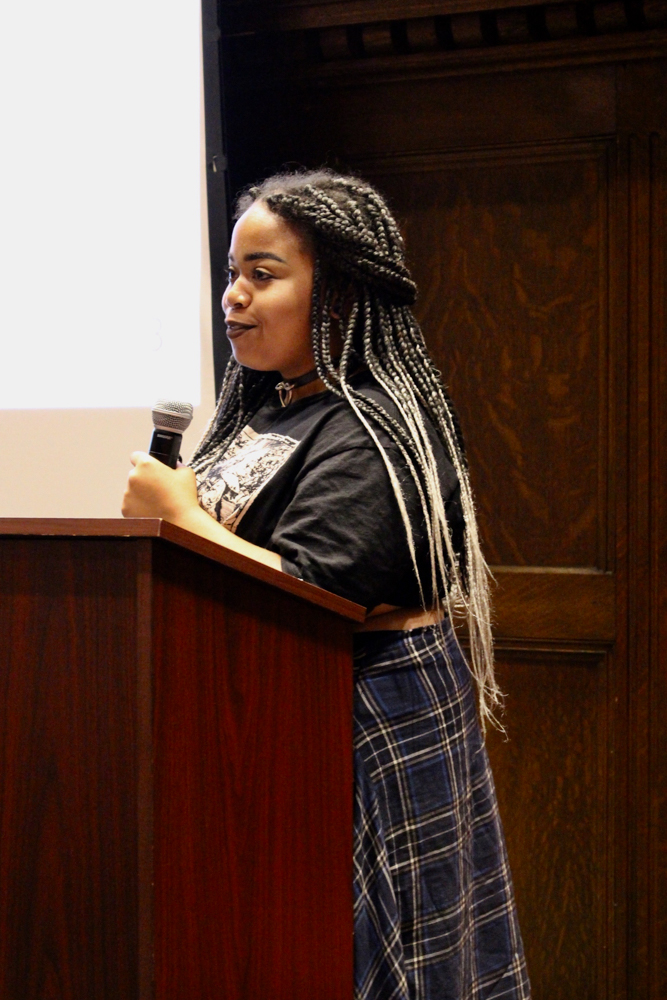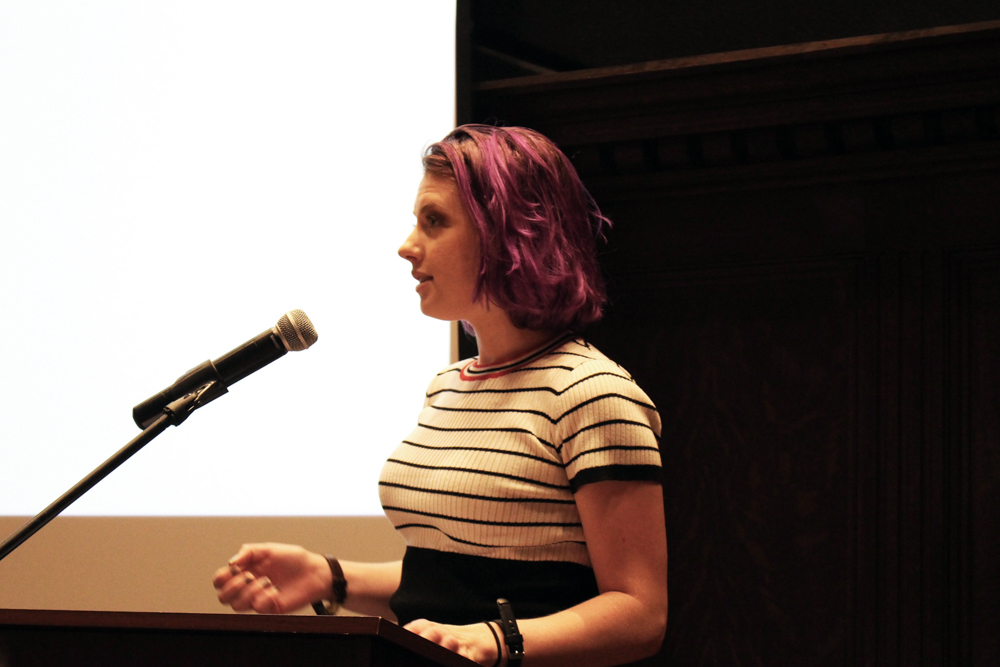
Oxy from the Inside (OFTI), an event created to de-stigmatize mental health on campus put on by Active Minds, took place in Choi auditorium April 9. At the event, a group of students shared their experiences with mental health in front of a public audience of peers.

OFTI, which started at Occidental four years ago, looked to promote a theme of strength through vulnerability, according to Yingfei Xin (sophomore), one of the organizers of the event. Xin said the purpose of OFTI is for students to listen to their peers‘ stories of mental health and to recognize they are not alone.
“It’s an experience for the audience themselves, because it helps them realize that other people are going through the same thing,” Xin said. “It’s also empowering for the speakers because they get to share their story in a very brave way.”
Occidental’s Active Minds chapter recently won the Stephanie Becker Fund Chapter of the Year Award. OFTI was cited as proof of Occidental creating a culture of mental health on campus, according to Robin Pounders (senior), lead organizer and co-president of Active Minds.
Daviona Moore (sophomore), a speaker at the event, said OFTI offered her an opportunity for self-reflection. Moore said the event allowed speakers to unpack their own experiences with mental health that may have been repressed.
“Immediately after something traumatizing happens, you try your best to repress it–but now you’re being forced to face it again,” Moore said. “But of course, to your own capacity.”

Moore said the event allowed her to be open with a lot of different communities in her life.
“You get to tell your story to different people from a lot of different walks of life,” Moore said. “And you probably wouldn’t have those conversations with them otherwise.”
According to Sophie Kaviar (first year), one of the speakers at the event, OFTI was a huge part of her recovery process. Kaviar said OFTI gave her an opportunity to validate her own experiences with mental illness in front of a large crowd of people.
“It’s empowering to be vulnerable in such a public way,” Kaviar said. “It makes you feel a lot less ashamed and a lot less alone when you hear about people going through stuff that you’re going through.”
OFTI was inspired by other college campuses’ “Mental Health monologues,” according to Junko Anderson (sophomore), another organizer of the event. In order to participate in OFTI, students apply via written application. If selected, they work to develop their story over the course of five to six weeks, working with the organizers to write a coherent narrative they are ready to present.
“By having these honest conversations or honest monologues, we’re creating space for people to not feel ashamed or closed in because of whatever mental health journey they’re on,” Anderson said.
OFTI wanted to have a narrative space to show the faces of the people whose stories were being told, Anderson said, allowing the speakers to own their experiences without labels or others making assumptions.
“We really do focus on the speakers. We tell them, ‘this is about you reclaiming your story,’” Anderson said.
OFTI is a validating experience for the audience, Xin said. Speakers are supported through the affirmations that the audience members can either text in or write down for the speakers after the event. According to Moore, the affirmations were positive and allowed audience members to voice that they were going through similar mental health experiences.
In the past, OFTI had issues with stories being alarming and organizers questioning what the role of triggers should be, Pounders said. However, the organizers have worked with speakers to navigate the triggers in their stories through the feedback they give back. This year, OFTI organizers amended the program they hand out to the audience members to include trigger warnings, because mental health inevitably is a triggering experience, according to Pounders.
“Our most important experiences are some of our most pivotal — and are triggering,” Pounders said.

People assume Occidental is a good place for mental health, but, according to Pounders, there are still misconceptions the campus needs to work through.
“There’s this assumption that students should always be working hard, students should always be on edge, students should always be burning out,” Pounders said. “That hardship in college is just a natural thing.”
More support is needed for college students, according to Xin.
“A lot of parents and perhaps educators think that stereotype as well,” Xin said. “If we believe in this, we’re going to ignore a lot of the issues concerning mental health.”
OFTI begins to address this stigma while also contributing to a culture of change since change happens on an individual level, Anderson said. They have been reading the affirmations that people texted in for the speakers and writing them down to share with them.
“People are writing, ‘I’ve known you all this time and I’ve never considered what you’re going through’ and ‘you’ve totally changed how I think of you personally,” Anderson said. “Community change is all about changes on a personal level.”
According to Kaviar, the event looks to destigmatize even our preconceptions of what mental health looks like.
“It helps you realize: mental illnesses do not have a body,” Kaviar said. “You don’t have to look a certain way, you don’t have to sound a certain way, you don’t have to have certain symptoms to be struggling to deserve help.”
The event contributes to destigmatizing mental health at Occidental because there’s so much variety in the stories being shared, according to Moore.
“A decent portion of us mentioned anxiety–however, no one’s was exactly the same,” Moore said. “People frame things differently. Some experiences are more impactful to some than they are to others–they’re weighted differently.”
Ultimately, an event where students can actively claim their stories is needed, according to Pounders.
“It gives the power back to you,” Pounders said.
A previous version of this article incorrectly identified Yingfei Xin as a junior. She is a sophomore.
![]()



































